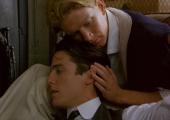Armistead Maupin's Tales of the City, Netflix, review - sex and dope soap is back in San Francisco

The pioneering stories of LGBT+ lives and loves resume with new faces and old
It helps to be of a certain vintage to appreciate the first impact of Tales of the City. Armistead Maupin’s column, begun in the San Francisco Chronicle in 1978 as a frank and joyous portrayal of gay culture, became a series of half a dozen cult novels. These started appearing in the UK from the mid-1980s.









